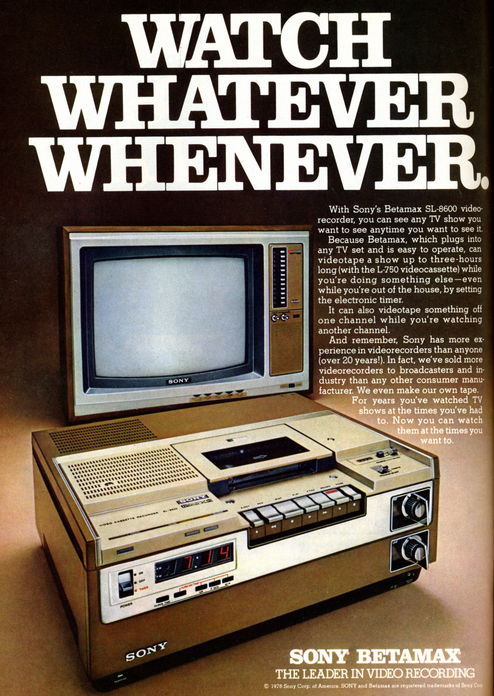On This Day In 1984, The Supreme Court Saved The VCR From Certain Death
 Does the thought of missing your favorite show make you want to sit firmly planted in front of the television all day every day? What if you didn’t have the option of using a DVR or (gasp!) tape recorder? You almost didn’t, except for an important ruling made 30 years ago.
Does the thought of missing your favorite show make you want to sit firmly planted in front of the television all day every day? What if you didn’t have the option of using a DVR or (gasp!) tape recorder? You almost didn’t, except for an important ruling made 30 years ago.
Today marks the 30th anniversary of the Sony Corp. v. Universal Studios decision, also known as the Betamax case, which paved the way for such innovations as your beloved DVR.
In 1984, the Supreme Court ruled that Sony could continue to sell its Betamax videocassette recorder, overruling the U.S. 9th Circuit Court of Appeals judgement that held Sony liable for consumers’ copyright infringement.
The lawsuit, which began in California District Court in 1976, charged that because Sony manufactured a device that could be used for copyright infringement the company was liable for infringement committed by consumers of Betamax.
Justice John Paul Stevens’ majority opinion in the case deemed home videotaping legal in the United States. The ruling also bore an important principle that has been used time and time again in lawsuits – if a product has a substantial, legitimate use it can be sold, even if some consumers use it illegitimately.
Losing the Betamax war wasn’t all bad news for studios like Universal. In fact, the home video business turned into one of the entertainment industry’s biggest money makers.
Sadly, just four years after the ruling, Sony conceded defeat to JVC’s cheaper VHS format. While Betamax continued to have success overseas, it all but died in the United States.
But the Betamax victor lives on and continues to make an impact on how court cases are determined. Last summer, Dish won an impressive battle in the war between their ad-skipping Hopper-DVR and the major network broadcasters. The Hopper allows users to go back several hours later and watch prime-time programming without any of the commercials.
Just last week the Supreme Court agreed to hear a lawsuit filed by broadcast networks against streaming video startup Aereo – a streaming video service that takes freely available over-the-air broadcast signals and provides them to paying customers online.
What the 1984 Betamax ruling did for us all [The Los Angeles Times]
Want more consumer news? Visit our parent organization, Consumer Reports, for the latest on scams, recalls, and other consumer issues.

